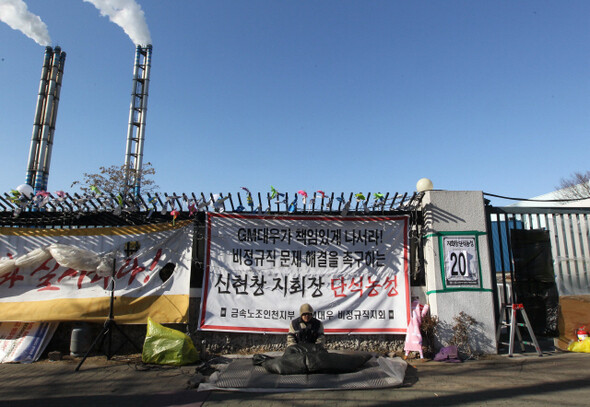hankyoreh
Links to other country sites 다른 나라 사이트 링크
Supreme Court recognizes GM Korea’s illegal dispatch work

By Kim Jeong-pil, staff reporter
The South Korean Supreme Court made its first decision recognizing subcontracting of automobile production as illegal dispatch work, also determining that both the manufacturer and the business owner of the partner company have the same degree of criminal liability.
Despite the fact that it is forbidden for workers to be dispatched in the direct assembly lines of manufacturers, companies in the industry have been using illegal dispatch workers by exploiting legal loopholes through subcontracting. Now that the Supreme Court has set a precedent for criminal prosecution of business owners, it is expected that there will be changes in such industry practices.
On Feb. 28, the Supreme Court, presided over by judge Yang Chang-su, upheld the decision of the appeals court. The court had ruled that David Nick Reilly, the former president of GM Daewoo Motors who had been indicted on charges of violating the Act on the Protection of Temporary Agency Workers, should pay a fine of 7 million won (US$6,457). Fines of 3 to 4 million were also upheld for six other defendants who had been tried on the same charges as Reilly, including a man surnamed Kim who is president of a partner company to GM Daewoo.
"Our examination of the contract between GM Daewoo and the partner company and of the actual work process shows that the employees of the partner company are effectively dispatch workers who are dispatched to the GM Daewoo workplace where they provide work under the supervision and direction of GM Daewoo," the court said. While by all appearances GM Daewoo and the partner company had signed a contract for outsourcing, in the court's view, the work was actually illegal dispatching, which is illegal.
"The defendants were fully conscious that they might violate the Act on the Protection of Temporary Agency Workers. But even if they were not aware that their behavior violated the law, that is not sufficient reason to exempt them from their criminal liability," the court said.
"We expect that this decision will contribute to protecting workers from a situation where they are involved in illegal dispatching," a member of the Supreme Court said.
In Dec. 2006, Reilly was served a summary fine of 7 million won (US$6,456) on charges of having had 843 workers dispatched from six partner companies who had signed contracts with GM Daewoo from Dec. 22, 2003 to Jan. 26, 2005 to work on the production line. However, Reilly objected to this and requested a formal trial. In the initial trial, the court found Reilly innocent, judging the relationship to be one of legal subcontracting, but the appeals court found that it was illegal dispatching and fined the defendants.
Please direct questions or comments to [english@hani.co.kr]

Editorial・opinion
![[Column] Season 2 of special prosecutor probe may be coming to Korea soon [Column] Season 2 of special prosecutor probe may be coming to Korea soon](https://flexible.img.hani.co.kr/flexible/normal/500/300/imgdb/original/2024/0426/3317141030699447.jpg) [Column] Season 2 of special prosecutor probe may be coming to Korea soon
[Column] Season 2 of special prosecutor probe may be coming to Korea soon![[Column] Park Geun-hye déjà vu in Yoon Suk-yeol [Column] Park Geun-hye déjà vu in Yoon Suk-yeol](https://flexible.img.hani.co.kr/flexible/normal/500/300/imgdb/original/2024/0424/651713945113788.jpg) [Column] Park Geun-hye déjà vu in Yoon Suk-yeol
[Column] Park Geun-hye déjà vu in Yoon Suk-yeol- [Editorial] New weight of N. Korea’s nuclear threats makes dialogue all the more urgent
- [Guest essay] The real reason Korea’s new right wants to dub Rhee a founding father
- [Column] ‘Choson’: Is it time we start referring to N. Korea in its own terms?
- [Editorial] Japan’s rewriting of history with Korea has gone too far
- [Column] The president’s questionable capacity for dialogue
- [Column] Are chaebol firms just pizza pies for families to divvy up as they please?
- [Column] Has Korea, too, crossed the Rubicon on China?
- [Correspondent’s column] In Japan’s alliance with US, echoes of its past alliances with UK
Most viewed articles
- 1‘We must say no’: Seoul defense chief on Korean, USFK involvement in hypothetical Taiwan crisis
- 2After election rout, Yoon’s left with 3 choices for dealing with the opposition
- 3Why Kim Jong-un is scrapping the term ‘Day of the Sun’ and toning down fanfare for predecessors
- 4AI is catching up with humans at a ‘shocking’ rate
- 5Noting shared ‘values,’ Korea hints at passport-free travel with Japan
- 6[Editorial] Korea’s surprise Q1 growth requires objective assessment, not blind fanfare
- 7Two factors that’ll decide if Korea’s economy keeps on its upward trend
- 8Yoon says collective action by doctors ‘shakes foundations of liberty and rule of law’
- 9Amnesty notes ‘erosion’ of freedom of expression in Korea in annual human rights report
- 10South Korea a veritable tax break paradise for chaebol